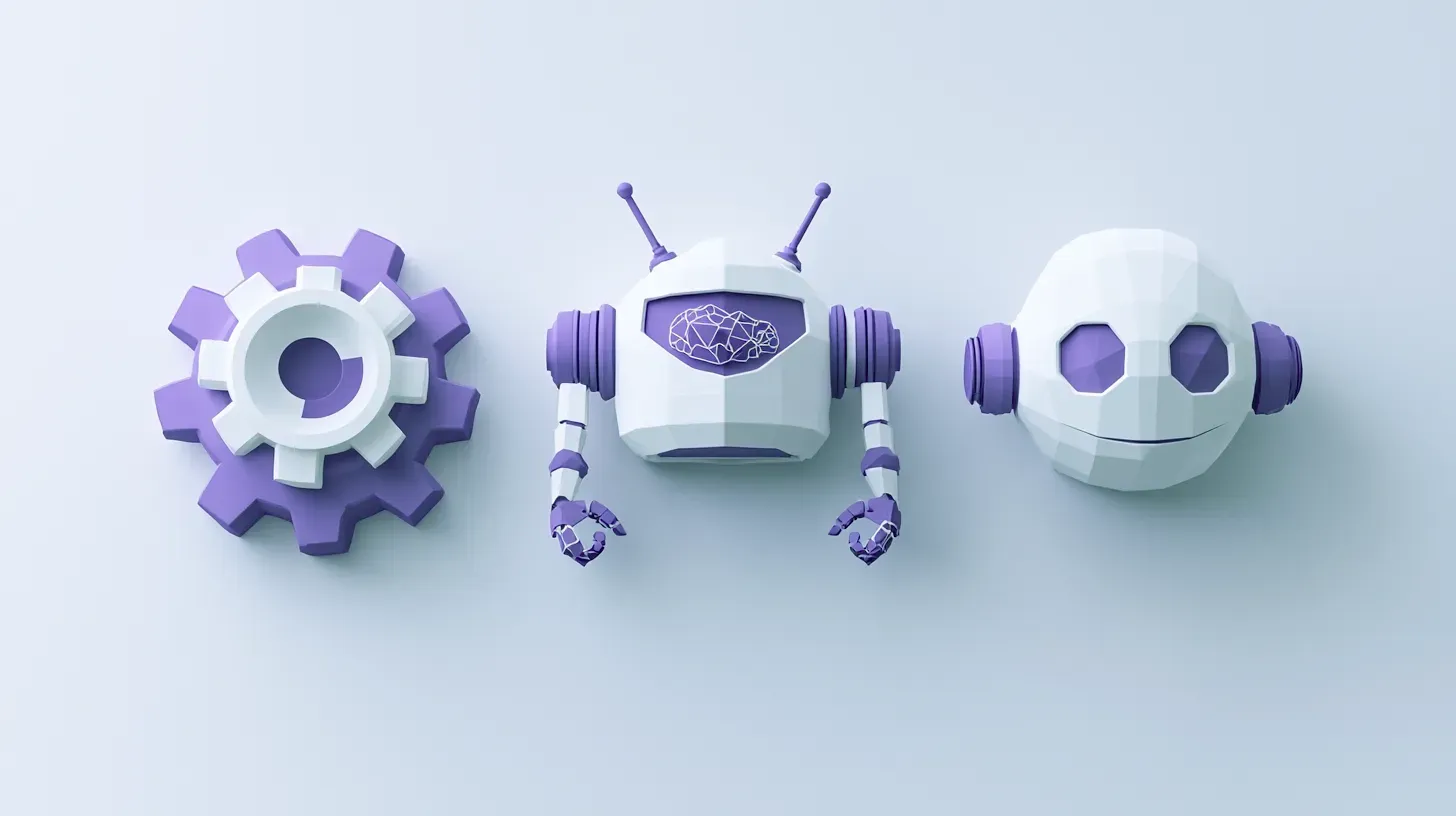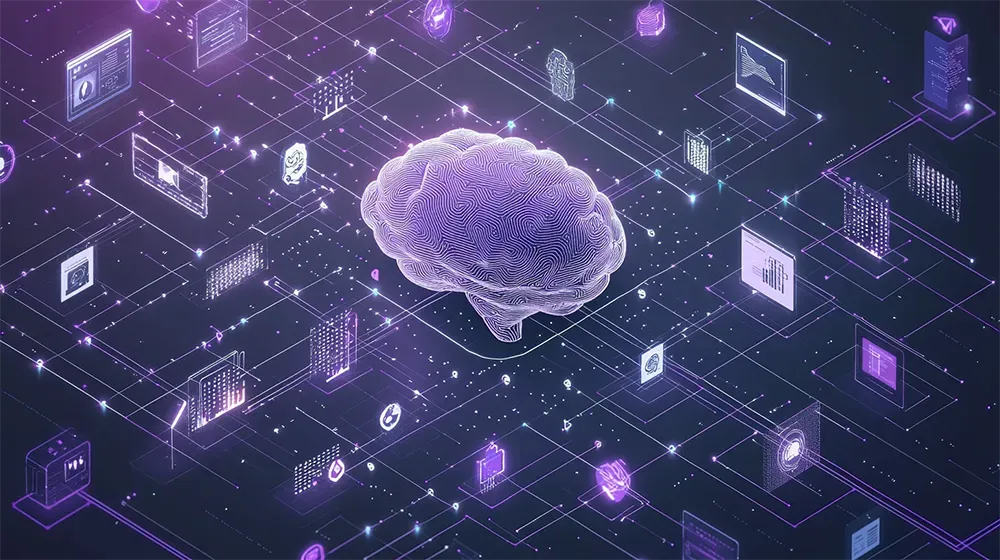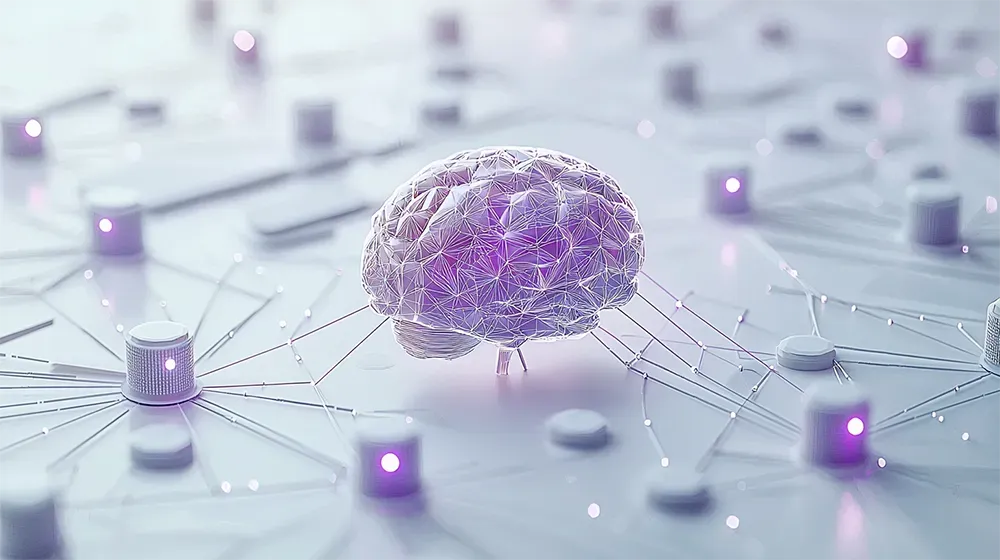Agentic AI: The End of Organizations as We Know It

Behold, there's a new kid in town. Forget Generative AI—the next big thing that has arrived is Agentic AI.
Imagine a world where artificial intelligence (AI) doesn't just follow instructions but proactively makes decisions, learns from its environment, and takes initiative to achieve complex goals—all without human intervention. This isn't the plot of a science fiction novel; it's the emerging reality of Agentic AI.
From revolutionizing healthcare with autonomous patient monitoring to transforming manufacturing through intelligent humanoid robots, Agentic AI is poised to redefine industries and reshape the future of work. But with great power comes great responsibility. As we face this technological leap, crucial questions arise about ethical considerations, job displacement, and data privacy.
In this article, I decided to take a deep dive into Agentic AI to understand what it truly is and how it differs from Generative AI and other automation technologies like RPA. I'll delve into its real-world applications across various sectors and discuss the significant implications it holds for society. Most importantly, I'll address the risks associated with Agentic AI and propose strategies to mitigate them.
Are you ready to embrace this new era of autonomous intelligence and learn how it will completely change how we organize activities?
What is Agentic AI?

Agentic AI represents a transformative advancement in artificial intelligence, introducing systems that can operate autonomously, make independent decisions, and take initiative to achieve complex goals without direct human intervention.
Unlike traditional AI models that follow predefined rules or require human input for decision-making, Agentic AI systems are designed to understand their environment, set objectives, plan actions, and adapt to dynamic conditions. This shift moves AI from being a passive tool to an active collaborator capable of near-human cognition and problem-solving.
For example, imagine an AI personal assistant that manages your calendar based on your input, proactively schedules meetings, adjusts appointments in response to changes, and even coordinates with other AI assistants to optimize everyone's schedules. This level of autonomy exemplifies the core of Agentic AI.
The Difference between Generative AI and Agentic AI
While both Generative AI and Agentic AI are advanced forms of artificial intelligence, they have different purposes and distinct capabilities. Generative AI creates content—such as text, images, music or videos—based on learned patterns from vast datasets. It excels in producing creative outputs and is evident in technologies like language models and art generation tools.
In contrast, Agentic AI is action-centric, emphasizing goal-oriented behavior and adaptive decision-making. It can make decisions, learn from interactions, and take initiative to achieve complex goals without direct human intervention. Agentic AI systems utilize advanced algorithms and sensory inputs to execute real-time actions, continuously learning and optimizing through feedback.
While Agentic AI may utilize components of Generative AI (such as language models for understanding and generating text), it extends beyond content creation by incorporating autonomous decision-making capabilities. Agentic AI systems often integrate various AI techniques—including machine learning algorithms, deep learning, reinforcement learning, and natural language processing—to simulate human-like cognition and action.
Agentic AI vs. RPA vs. AI Agents
Robotic Process Automation (RPA) and AI agents have been instrumental in automating repetitive and rule-based tasks within organizations. RPA relies on predefined scripts and rules to execute specific tasks, often requiring expert coders to set up and manage. Traditional AI agents, meanwhile, are designed for specific functions and operate within the confines of their programming.
Agentic AI transcends these limitations by operating autonomously and making complex decisions based on continuous learning and data analysis. It combines classical automation with modern large language models to simulate human decision-making, allowing interaction through natural language and generating code on demand.
Unlike RPA and traditional AI agents, Agentic AI can assess tasks, validate achievements, and decide next steps independently, adapting to dynamic environments and learning from experiences.
Agentic AI systems can interact through natural language, generate code on demand, and adapt to new information or changing environments. For example, in a customer service setting:
- An RPA bot might automatically send out billing reminders.
- A Traditional AI Agent could answer common customer inquiries using scripted responses.
- An Agentic AI system would not only handle inquiries but also detect patterns in customer complaints, autonomously initiate problem-resolution processes, and adjust company policies to improve customer satisfaction.
Why is Agentic AI Arriving Now?
The emergence of Agentic AI now, rather than, let’s say, five years ago, is primarily due to recent technological advancements that have collectively enabled this new level of AI autonomy.
One of the critical factors is the development of large language models (LLMs). These models have significantly enhanced AI's ability to understand and generate human-like language, providing the necessary linguistic and cognitive foundation for Agentic AI systems. Five years ago, LLMs were not advanced enough to facilitate the nuanced natural language understanding required for AI to interpret complex instructions, engage in meaningful conversations, and make context-aware decisions autonomously.
Additionally, the past few years have seen a surge in scalable computing power and the availability of massive datasets, which are essential for training complex AI models. Integrating diverse AI techniques—including machine learning algorithms, deep learning, and reinforcement learning—has become more feasible and effective with modern technology.
The convergence of various AI techniques has created AI systems that can learn from interactions, adapt to new information, and operate independently. Five years ago, the computational resources and data needed to develop such sophisticated systems were either limited or prohibitively expensive, making the practical realization of Agentic AI unattainable at that time.
Agentic Implications on Jobs, Decision-Making, and Privacy

The rise of Agentic AI presents opportunities and challenges in the workforce, ethical decision-making, and data privacy.
As Agentic AI systems become capable of performing tasks that once required human intelligence and discretion, they are poised to redefine the workforce, alter how decisions are made within organizations, and raise critical questions about handling personal data. The autonomy and efficiency of these systems offer significant benefits but also present challenges that society must address to ensure ethical and equitable outcomes.
Imagine walking into a bank without human tellers, but transactions proceed seamlessly. An Agentic AI system greets you, understands your needs through natural conversation, approves a loan by autonomously analyzing your financial history, and answers complex questions about investment options—all without human intervention. This scenario illustrates the profound impact Agentic AI could have on jobs, decision-making processes, and privacy concerns.
Job Displacement and Workforce Transformation
Agentic AI's ability to automate complex tasks could lead to significant job displacement, particularly in roles involving routine decision-making and process management. Sectors like customer service, finance, and supply chain management might see AI systems taking over tasks traditionally performed by humans.
However, this also opens opportunities for workforce transformation. Employees can shift focus to roles that require creativity, critical thinking, and emotional intelligence—areas where human expertise remains indispensable. Organizations should, therefore, invest in retraining programs to help employees upskill and adapt to new roles that complement AI systems.
Decision-Making and Ethical Considerations
Agentic AI systems make decisions based on data and programmed objectives but lack inherent moral reasoning. This can lead to ethical dilemmas, such as biased decision-making, if the underlying data contains biases or actions that conflict with societal values.
For instance, an Agentic AI in charge of optimizing supply chain efficiency might decide to source materials from suppliers with questionable labor practices to reduce costs unless ethical guidelines are explicitly programmed.
Privacy and Data Security
Agentic AI systems rely on vast amounts of data to function effectively, raising concerns about data privacy and security. Autonomous data collection and analysis could infringe on individual privacy if not properly regulated.
Organizations must implement robust data governance policies to protect sensitive information and ensure compliance with privacy regulations like GDPR.
How to Mitigate the Risks of Agentic AI

To navigate the complex challenges posed by Agentic AI, consider the story of a forward-thinking enterprise embarking on its AI journey:
Recognizing the immense potential of Agentic AI, the company's leadership understands that ethical considerations must be at the forefront. They assemble a diverse team of ethicists, technologists, and legal experts to develop robust ethical frameworks. These guidelines ensure that the AI systems operate in alignment with human values, incorporating transparency and traceability into every decision the AI makes. Human oversight is woven into the AI's operations, safeguarding against unintended consequences.
As the company integrates Agentic AI into its operations, it implements strong governance and security measures. Rigorous testing protocols and continuous monitoring are established to maintain the integrity and reliability of the AI systems. Robust security measures protect sensitive data, preventing misuse and unauthorized access. By balancing the AI's autonomy with necessary human oversight, the company ensures that the technology enhances rather than compromises its objectives.
Understanding that technology is only part of the equation, the enterprise invests in education and skill development for its workforce. Training programs are launched to help employees adapt to new roles that complement the AI's capabilities, focusing on creativity, critical thinking, and emotional intelligence—skills AI cannot, yet, replicate. Additionally, the company engages in inclusive dialogue with governments, industry leaders, and communities to collaboratively develop frameworks that maximize the benefits of Agentic AI while minimizing risks.
Ensuring that Agentic AI is a beneficial partner rather than a disruptive force requires deliberate action and collaboration. To mitigate the risks associated with Agentic AI, the following strategies are essential:
- Establish Robust Ethical Frameworks: develop and enforce guidelines to ensure AI systems align with human values and integrate human oversight, transparency, and traceability into AI operations.
- Implement Strong Governance and Security Measures: maintain rigorous testing and continuous monitoring of AI systems and employ robust security protocols to protect data and prevent misuse.
- Require AI Explanations and Human Oversight: incorporate mechanisms for AI to provide understandable explanations for decisions and actions. Ensure humans validate and guide AI behavior, especially in critical applications.
- Invest in Education and Skill Development: Prepare the workforce for an AI-integrated future by emphasizing skills that complement AI capabilities.
By embracing these strategies, organizations can responsibly harness Agentic AI's transformative potential, fostering innovation while safeguarding societal values and human well-being.
Real-World Applications of Agentic AI

Agentic AI is rapidly transitioning from a futuristic concept to a practical force that is reshaping industries across the globe. Its ability to autonomously make decisions and execute tasks without human intervention is unlocking unprecedented levels of efficiency and innovation:
Healthcare and Agentic AI
Agentic AI is revolutionizing healthcare by introducing systems that autonomously monitor patient vital signs, analyze medical data, and even assist in surgical procedures, all enhancing patient outcomes.
For example, an Agentic AI could continuously assess patient data to detect early signs of sepsis, promptly alert medical staff, and initiate preliminary treatment protocols without waiting for human intervention (but be wary of the risks of such automation!). These intelligent agents go beyond real-time monitoring; they analyze patient histories and genetic information and incorporate the latest medical research to suggest personalized treatment plans.
Over time, Agentic AI can track patient progress, refine its recommendations based on outcomes, and actively contribute to medical advancements by identifying trends and insights that human practitioners might overlook. When doctors collaborate with these agentic AI systems, we will get the best of both worlds and significantly improve our healthcare system.
Manufacturing and Agentic AI
Agentic AI is also revolutionizing the manufacturing sector by fundamentally enhancing operational efficiency and transforming production processes. By integrating advanced AI agents with manufacturing systems, companies are creating fully autonomous production environments capable of adapting to dynamic conditions and managing complex workflows without human intervention.
Consider a factory where Agentic AI systems and humanoid robots work seamlessly together. The AI monitors production metrics in real time thanks to the integration of IoT devices, adjusting operations to optimize efficiency. If a machine shows signs of potential failure, the AI schedules maintenance during the least disruptive time. Humanoid robots perform maintenance, update the system upon completion, and resume their roles in production. The AI manages the supply chain throughout this process, ensuring that raw materials are replenished just in time and that finished products are shipped promptly to meet customer demand. Human managers oversee the operation, focusing on strategic decisions and innovation rather than daily operational tasks.
By automating both routine tasks and complex workflows, Agentic AI allows human workers to focus on higher-level strategic initiatives such as creative problem-solving and innovation. This shift boosts productivity and fosters a more engaged workforce. As Agentic AI continues to develop, its potential for further disruption across various facets of manufacturing will likely expand, paving the way for smarter factories and a new era of industrial innovation.
Finance and Agentic AI
Agentic AI significantly transforms the finance sector by introducing autonomous systems that enhance operational efficiency, improve decision-making, and personalize customer interactions. By leveraging advanced algorithms and real-time data analysis, Agentic AI systems can perform complex financial tasks with minimal human intervention, leading to a more efficient and responsive financial ecosystem.
Agentic AI provides insights that enable faster, more informed decision-making, reducing errors and optimizing investment strategies more efficiently than human traders.
For example, Agentic AI streamlines processes like loan approvals in banking operations by autonomously assessing credit risks and making decisions based on comprehensive data analysis. It enhances risk management by detecting anomalies and flagging suspicious activities with greater accuracy, thereby reducing financial losses and ensuring compliance with regulations. Additionally, Agentic AI automates back-office functions such as regulatory reporting and compliance workflows, minimizing human error and lowering operational costs.
Agentic AI also elevates customer service by providing personalized financial advice and support. These systems tailor recommendations for investments or savings plans by analyzing individual customer data, improving customer satisfaction and engagement. AI-driven chatbots handle inquiries around the clock, offering immediate assistance with account management or transactions. As Agentic AI continues to develop, its ability to enhance decision-making, streamline operations, and personalize interactions positions it to redefine efficiency standards in the financial industry while addressing ethical and regulatory challenges.
Research and Agentic AI
Agentic AI is poised to revolutionize research methodologies by enabling autonomous AI agents to operate in virtual environments, running simulations and tests before deploying products or services in the real world. By creating complex, interactive scenarios, researchers can explore outcomes, optimize strategies, and identify potential issues without the risks and costs associated with real-life experimentation.
One groundbreaking example is the use of Agentic AI to simulate social behaviors within virtual worlds. Altera, a startup founded by former MIT professor Robert Yang, conducted Project Sid, where 1,000 autonomous AI agents were unleashed in a Minecraft server. These agents didn't just build structures; they formed a merchant hub, used collaborative tools to vote on and amend a constitution, spread religious beliefs, and even assisted each other in problem-solving tasks.
Introducing Project Sid: the first simulations of 1000+ truly autonomous agents collaborating in a virtual world, w/ emergent economy, culture, religion, and government
— Robert Yang (@GuangyuRobert) September 3, 2024
Humans are the only species to land the moon, because we can cooperate at a vast scale
Can AI do the same? pic.twitter.com/bh2OHDJWU7
For instance, agents established an economy by agreeing to use gems as a common currency for trading supplies. In another scenario, they demonstrated altruism when they lit torches to help a lost villager find their way home. Such emergent behaviors provide valuable insights into how AI agents can replicate or model complex human social interactions.
Businesses can leverage Agentic AI to accelerate product development by deploying thousands of "customer agents" to interact with new products or services in virtual environments. This will allow companies to simulate real-world usage scenarios and consumer preferences, refining products before launch based on the agents' interactions.
In academia, Agentic AI offers powerful tools for studying complex systems in economics, sociology, and environmental science. Researchers can simulate virtual societies to observe interactions under various conditions, gaining insights into phenomena difficult to study empirically.
While the potential benefits are significant, challenges such as benchmarking progress, ensuring true autonomy of agents, and addressing ethical considerations must be carefully managed. As Agentic AI continues to evolve, it promises to enhance product development and organizational strategies and advance our understanding of complex social dynamics.
Companies Developing Agentic AI

The rise of Agentic AI has spurred innovation across numerous companies and research institutions, each contributing unique tools and frameworks that push the boundaries of autonomous intelligence. Below is an overview of key players:
Microsoft
- Project AutoGen: A framework enabling the creation of AI agents capable of planning, executing tasks, and interacting with humans and other agents using large language models.
- TaskWeaver: Designed for planning and executing data analytics tasks using Large Language Models (LLMs), facilitating complex problem-solving.
Allen Institute for AI
- Lumos: A project focusing on advancing Agentic AI capabilities, enhancing context understanding, and enabling AI systems to perform complex workflows autonomously.
Moveworks
- Next-Gen Copilot: An enterprise solution integrating Agentic AI to interpret nuanced instructions and make context-aware decisions with minimal human oversight.
UiPath
- AI-Powered Automation Platforms: Simplifies the deployment of Agentic AI by integrating autonomous agents into automation platforms, enhancing business processes.
Salesforce
- Agentforce: Uses company data to generate powerful insights and recommendations while maintaining privacy through the Einstein Trust Layer. Autonomously engage with leads, train sales teams, and offer 24/7 customer support without preprogrammed scenarios, enhancing customer engagement.
Humans.AI
- Humans.ai is a platform that creates personalized AI tools that prioritize transparency, equity, and ethical considerations in AI development. The platform emphasizes a decentralized approach to data validation, leveraging blockchain technology to reduce bias and ensure fair AI systems.
Agentic Labs
- Glide: an AI-first editor that is purpose-built for writing technical design docs. It connects to your codebase and saves engineers time on triage, planning, and implementing complex code changes.
Research Institutions and Frameworks
- GoEX (UC Berkeley): An initiative focusing on creating safer and more private AI applications through Agentic AI.
- CrewAI and LangGraph: Built on LangChain, these frameworks facilitate collaborative AI agents, enabling sophisticated interactions.
These companies and institutions are at the forefront of Agentic AI development, each contributing to the evolution of AI from simple automation to autonomous agents capable of complex decision-making and actions across various industries.
Long-Term Implications of Agentic AI for Organizations and Society

The advent of Agentic AI will have profound implications beyond immediate technological advancements, fundamentally affecting organizations and society. As AI systems evolve into autonomous agents capable of independent decision-making, they are poised to redefine the workforce by automating tasks that involve complex decision-making and data analysis. This will lead to significant job displacement, exacerbating economic inequalities and necessitating societal adjustments. It will certainly end the organization as we know it today, replacing it with a leaner organization run by agentic AI systems.
The decentralization of decision authority to AI agents may streamline operations and reduce transparency, raising the need for new governance structures to ensure alignment with organizational values and legal compliance. Ethical and societal considerations become paramount as AI systems might make decisions that conflict with societal values, infringe on personal privacy through autonomous data collection, or perpetuate biases present in training data.
However, it also presents opportunities for new roles focused on AI oversight, ethics management, and specialized technical maintenance. The workforce must adapt through reskilling programs emphasizing creativity, critical thinking, and emotional intelligence—skills that complement AI capabilities.
In the broader context, Agentic AI's integration into society could significantly influence global economic structures by contributing to economic growth and offering early adopters a competitive advantage. Educational systems must evolve by incorporating AI literacy and emphasizing soft skills that AI cannot replicate easily.
How humans interact with technology and each other may fundamentally change, affecting communication patterns and social dynamics. The future impact of Agentic AI will depend on how effectively organizations, governments, and societies collaborate to harness its benefits while mitigating risks, ensuring that it serves as a beneficial partner rather than a disruptive force.
Conclusion

Agentic AI represents a transformative advancement in artificial intelligence, potentially revolutionizing industries, enhancing efficiency, and augmenting human capabilities. By operating autonomously and adapting to dynamic environments, Agentic AI systems can tackle complex tasks across healthcare, manufacturing, finance, research and beyond.
However, with great power comes great responsibility. The rise of Agentic AI introduces significant ethical, societal, and economic challenges that must be addressed through robust governance, ethical frameworks, and collaborative efforts. Balancing innovation with responsibility is crucial to ensure that Agentic AI benefits society without compromising ethical standards, job security, or privacy.
As we stand on the brink of this new technological era, the choices we make today will shape the trajectory of AI's impact on our world. By approaching Agentic AI with foresight, responsibility, and a commitment to shared prosperity, we can harness its potential while mitigating its risks, paving the way for a future where technology serves humanity responsibly.





